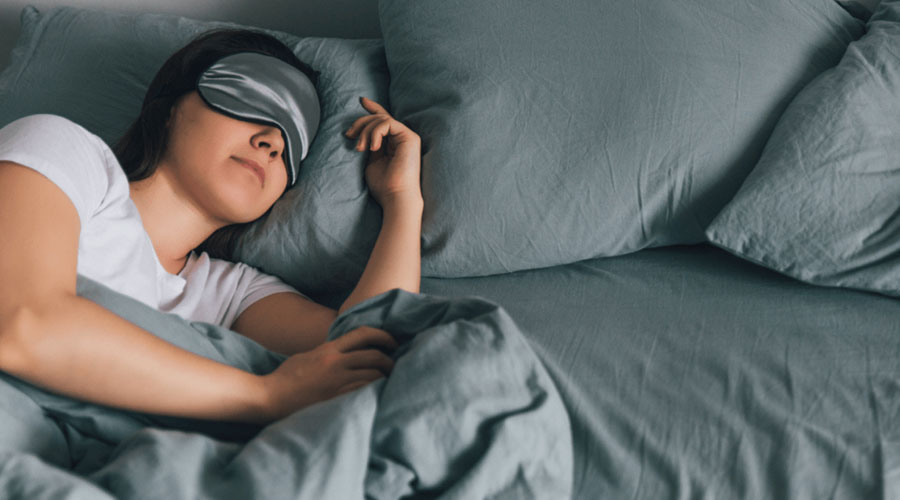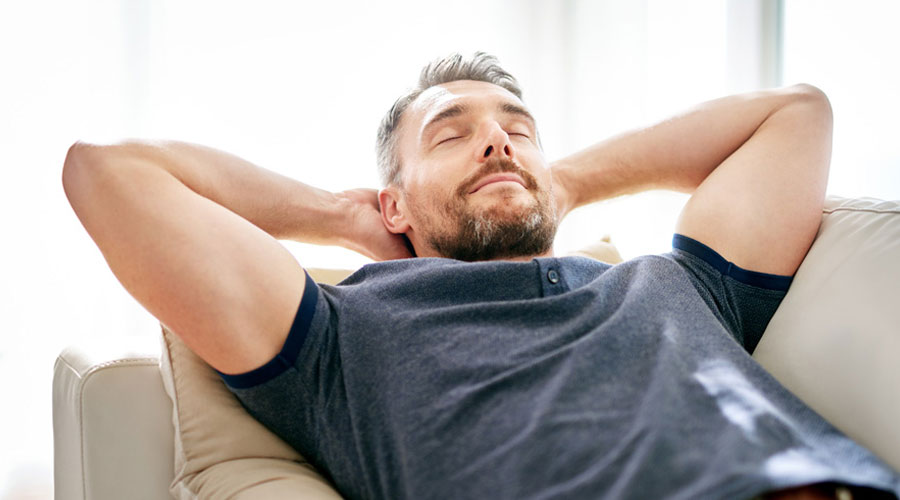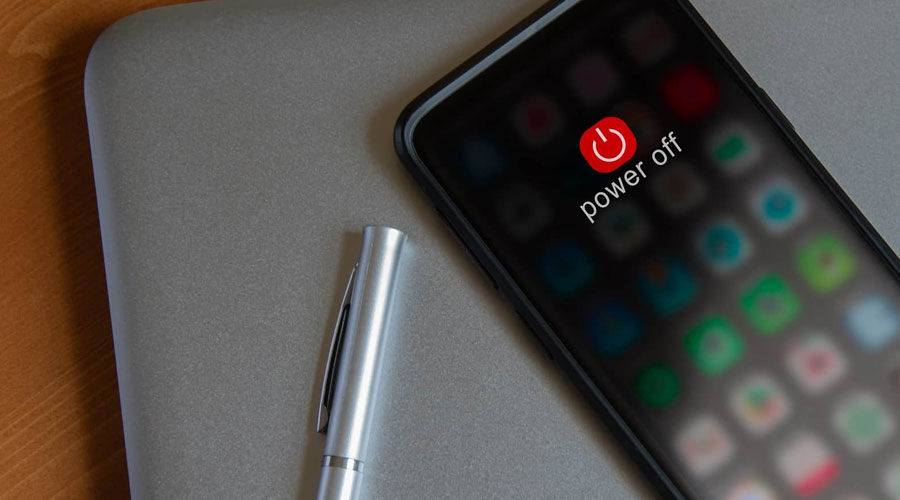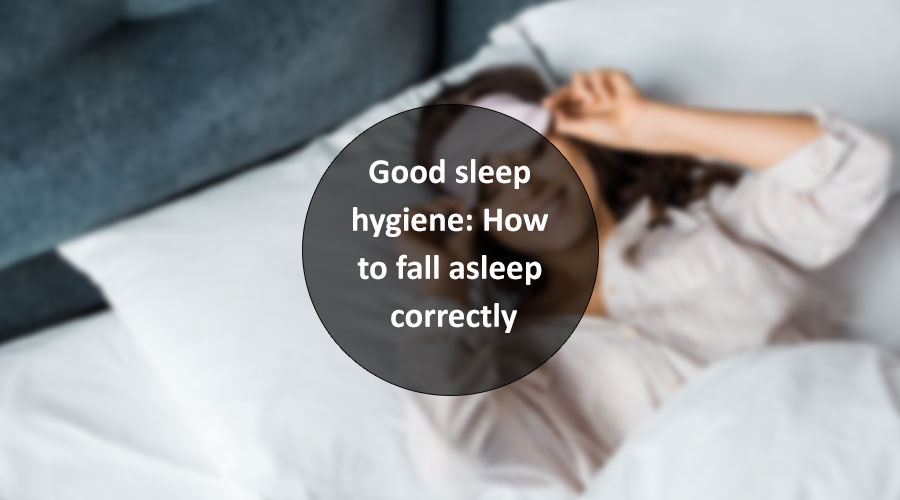Getting a good night’s sleep is essential for both your mental and physical health. Here are some tips to help you fall asleep correctly:
Create a relaxing bedroom environment.

Creating a relaxing bedroom environment is key to getting a good night’s sleep. Consider these tips:
- Keep the room cool and dark. The ideal sleeping environment is cool and dark. Try to keep the room temperature between 60 and 67 degrees Fahrenheit, and use blackout curtains to keep out light.
- Get rid of distractions. TVs, laptops, cell phones, and other electronic devices should be kept out of the bedroom. These devices can disrupt your sleep pattern and make it difficult to fall asleep.
- Create a calming atmosphere. Use soft lighting, soothing colors, and calming aromas to create a relaxing environment in your bedroom. Lavender is a great choice for a calming scent.
- Limit noise exposure. Exposure to noise pollution can also disrupt your sleep cycle.
Why is sleep hygiene important?

Sleep hygiene is extremely important for overall health and well-being. Poor sleep hygiene can lead to a number of health problems, including obesity, diabetes, heart disease, and chronic fatigue. There are several reasons why sleep hygiene is so important.
One reason is that during sleep, the body repairs and regenerates tissues. Poor sleep hygiene can disrupt this process and lead to health problems.
Sleep is also necessary for cognitive function. Poor sleep can lead to decreased focus, attention span, and decision-making skills. Additionally, lack of sleep can increase stress levels and impair immune system function.
To ensure good sleep hygiene, it is important to establish a regular bedtime routine, avoid caffeine and alcohol before bedtime, and create an environment that is conducive to good sleep.
How do you practice good sleep hygiene?

There are many things you can do to practice good sleep hygiene and get a good night’s sleep. Some of the most important include:
Keep a consistent sleep schedule

Practicing good sleep hygiene is one of the best ways to keep a consistent sleep schedule. Some of the basic things you can do to promote healthy sleep habits include going to bed and waking up at the same time each day, limiting caffeine and alcohol consumption, avoiding working or using electronic devices in bed, and getting regular exercise.
If you have trouble falling asleep or staying asleep, try some of these tips: establish a regular bedtime routine, create a relaxing environment in your bedroom, use comfortable sheets and blankets, practice deep breathing exercises or meditation before bed, and avoid watching television or working on the computer in the hours leading up to sleep. It’s also important to give yourself enough time to get a good night’s rest – most people need between 7 and 8 hours of sleep per night.
Manage stress before going to bed

Going to bed feeling stressed can make it difficult to fall asleep and get a good night’s sleep. Luckily, there are a few things you can do to manage your stress before going to bed.
One way to practice good sleep hygiene is to establish a regular bedtime routine. This could include winding down for 30 minutes before bed by reading, listening to calming music, or practicing relaxation exercises.
It’s also important to avoid caffeine and alcohol close to bedtime, as they can interfere with sleep. If you’re struggling to manage your stress, consider talking to a therapist or counselor who can help you develop strategies for coping with anxiety and stress. Taking steps to reduce stress before bed will help you get the rest you need and wake up feeling refreshed and energized.
Exercise regularly

There are many benefits to exercise, including reducing the risk of chronic diseases, improving mental health, and boosting your energy levels. But did you know that regular exercise can also help improve your sleep hygiene?
Exercise releases endorphins, which have a sedative effect and can help you fall asleep more easily. It also helps you stay asleep longer and reduces the number of times you wake up during the night.
Start by incorporating regular exercise into your routine. Aim for at least 30 minutes of moderate-intensity exercise most days of the week. And remember to avoid working out too close to bedtime – try to finish at least three hours before hitting the hay.
Go to bed only when you’re tired

Go to bed only when you’re tired. When you’re trying to get to sleep, keep the room cool, dark and quiet. Avoid using electronic devices in bed.
Get up and move around every few hours to keep your body active. If you can’t fall asleep within 20 minutes, get out of bed and do something calming until you feel sleepy.
Limit your caffeine intake

Most people know that caffeine is a stimulant. What many people don’t know is that caffeine can interfere with your sleep. Caffeine disrupts sleep by decreasing the time it takes to fall asleep, decreasing the length of time you spend in deep sleep, and causing more frequent awakenings during the night.
If you’re having trouble sleeping, try limiting your caffeine intake. Try to avoid caffeinated beverages after lunchtime. And if you can’t cut out caffeine entirely, try to drink no more than 200-300 milligrams per day. That’s about two cups of coffee or four cups of tea.
Turn off electronic devices before you go to sleep

Turn off electronic devices before you go to sleep. Blue light from electronic devices can suppress the production of melatonin, a hormone that helps regulate your body’s clock and promotes sleepiness.
When you’re trying to fall asleep, avoid watching TV, working on the computer, or using your phone. If you can’t resist the temptation to use electronics in the evening, try using a filter or app that reduces blue light exposure.
Use your bed only for sleep

Use your bed only for sleep. This means not using your bed for work, studying, watching TV, or eating. When you use your bed for these activities, it becomes harder to fall asleep and stay asleep.
Create a relaxing bedtime routine

Practicing good sleep hygiene is important for getting a good night’s sleep. This includes creating a relaxing bedtime routine. Some things you can do to create a relaxing bedtime routine include reading, taking a bath, and listening to calming music. Make sure to avoid screens and caffeine before bed, and try to relax your mind and body in the hours leading up to sleep.
What are the signs of poor sleep hygiene?

There are a few key signs that can indicate that someone has poor sleep hygiene. These include having a consistent bedtime routine, winding down for 30 minutes before sleep, limiting caffeine and alcohol intake, and making sure the bedroom is dark, quiet, and cool.
If someone is experiencing difficulty falling asleep, wakefulness throughout the night, or excessive daytime sleepiness, they may have poor sleep hygiene and should consult with a doctor. Poor sleep hygiene can lead to a number of health problems, such as heart disease, obesity, and diabetes.
Is sleep hygiene the same for everyone?

Sleep hygiene is the practice of promoting good sleep habits. However, there is no one-size-fits-all approach to sleep hygiene. What works for one person may not work for another. Factors such as age, health, and lifestyle can all affect how well someone sleeps.
There are a few basic sleep hygiene tips that are recommended for everyone. These include avoiding caffeine and alcohol before bed, reserving the bedroom for sleep and sex, and keeping a regular sleep schedule. However, beyond these basics, it’s important to tailor your sleep hygiene routine to fit your own needs.
If you’re having trouble sleeping, try experimenting with different things until you find what works best for you. Some people find that reading or listening to calming music before bed helps them get to sleep, while others prefer to avoid screens and other electronic devices in the hours leading up to bedtime.
Derivation
A good sleep hygiene is essential for a good night’s sleep. There are many ways to fall asleep correctly, and by following these tips, you can get the most out of your slumber. Be sure to avoid caffeine and alcohol before bed, establish a regular sleep schedule, and create a relaxing bedtime routine. If you’re still having trouble sleeping, talk to your doctor about possible solutions. Thanks for reading!
FAQ
What is considered sleep hygiene?
Sleep hygiene is the habits and practices that are necessary to have good sleep. People who have good sleep hygiene usually get enough sleep, feel rested when they wake up, and do not suffer from daytime fatigue or problems with concentration or productivity.
Good sleep hygiene includes things like going to bed and waking up at the same time every day, avoiding caffeine and alcohol before bed, and keeping a cool, comfortable environment in your bedroom.
How do you fix sleep hygiene?
Sleep hygiene is an important part of getting a good night’s sleep, but for many people, it can be difficult to stick to good habits. Here are a few tips for fixing your sleep hygiene:
- Set a regular bedtime and wake time, and try to stick to them as closely as possible.
- Avoid caffeine and alcohol before bed.
- Limit screen time before bed.
- Avoid working or using electronic devices in bed.
- Create a relaxing bedtime routine that includes winding down for 30 minutes before sleep.
- Make sure your sleeping environment is dark, quiet, and cool.
Why is sleep important for hygiene?
Sleep is important for hygiene because it allows the body to rest and recharge. During sleep, the body produces growth hormones that help repair tissues and muscles. Sleep also helps the body fight off infection by strengthening the immune system. Lack of sleep can lead to fatigue, which makes it difficult to maintain good hygiene habits.
What are the signs of poor sleep hygiene?
There are many signs that a person may have poor sleep hygiene. One sign is that a person has difficulty waking up in the morning and feels tired throughout the day. A person with poor sleep hygiene may also fall asleep during the day, have trouble focusing, be irritable, and have a low mood. Poor sleep hygiene can also lead to health problems such as obesity, heart disease, and diabetes.
What can poor sleep hygiene cause?
Poor sleep hygiene can lead to a variety of health problems. People who don’t get enough sleep are more likely to be obese and have heart disease or diabetes. They are also more prone to accidents at work or while driving. Poor sleep hygiene can also cause mental health problems, such as anxiety and depression.

